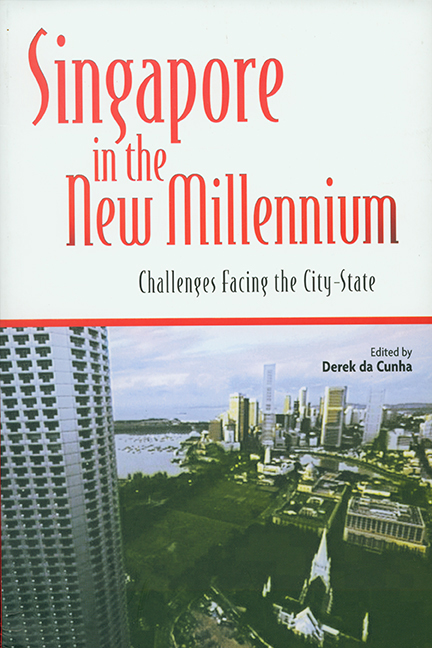Book contents
- Frontmatter
- Contents
- Preface
- Contributors
- 1 The Limits of a City-state: Or Are There?
- 2 External Challenges Facing the Economy
- 3 Governance: Its Complexity and Evolution
- 4 The Future of Civil Society: What Next?
- 5 Relating to the World: Images, Metaphors, and Analogies
- 6 Relating to the World: Images, Metaphors, and Analogies
- 7 Education in the Early 21st Century: Challenges and Dilemmas
- 8 Reframing Modernity: The Challenge of Remaking Singapore
- 9 National Identity, the Arts, and the Global City
- 10 The Media and the Flow of Information
- 11 Conclusion
- Index
9 - National Identity, the Arts, and the Global City
Published online by Cambridge University Press: 21 October 2015
- Frontmatter
- Contents
- Preface
- Contributors
- 1 The Limits of a City-state: Or Are There?
- 2 External Challenges Facing the Economy
- 3 Governance: Its Complexity and Evolution
- 4 The Future of Civil Society: What Next?
- 5 Relating to the World: Images, Metaphors, and Analogies
- 6 Relating to the World: Images, Metaphors, and Analogies
- 7 Education in the Early 21st Century: Challenges and Dilemmas
- 8 Reframing Modernity: The Challenge of Remaking Singapore
- 9 National Identity, the Arts, and the Global City
- 10 The Media and the Flow of Information
- 11 Conclusion
- Index
Summary
Introduction
The 19 July 1999 issue of Timemagazine had this blurb on its cover: “Singapore Swings: Can Asia's Nanny State Give Up its Authoritarian Ways?”. The magazine said, “Culturally, Singapore is permitting artists to stage a range of socially and politically controversial performances”. The major moment of change, it argued, came with the 1990 naming of Goh Chok Tong as the politician who would replace Lee Kuan Yew as Prime Minister, and this led to a formulation of cultural policy by the People's Action Party (PAP) Government. The National Arts Council was set up in 1991 and the Ministry of Information and the Arts created. This ministry had — as Timeput it, in its inimically over-wrought literary style — “PAP intellectual-in-waiting [George] Yeo in charge”. It said: “The new minister enthused about fostering a global renaissance city, about making Singaporeans more creative, about forging a civic society — the buzzwords flew like hornets among government departments.”
While it may be argued that Timeexaggerates the extent to which the Singapore state has changed in its attitude towards high culture and its relation to civil society at large — articulated as “civic society” by Minister Yeo — there is no doubt that, first, there has been a burst of high cultural energy since the 1980s and that, second, the state now has a discernible cultural policy in place — a key feature of which is a desire for Singapore to become a ldquo;Global City for the Arts” — in sharp contrast to the utilitarian and instrumental-rationalist 1960s and 1970s.
This chapter examines some of the developments that have occurred in the arts since the 1980s, along with the rapid attempts by the state to exploit the commercial potential of such developments, and considers how the arts ave to a fair degree been concerned with issues of identity, multiculturalism, cultural heritage, and history as a reaction to the Singapore state's top-down approach to economic orientation, along with an intensive modernization of society that allowed little space for cultural issues.
- Type
- Chapter
- Information
- Singapore in the New MillenniumChallenges Facing the City-State, pp. 221 - 242Publisher: ISEAS–Yusof Ishak InstitutePrint publication year: 2002



